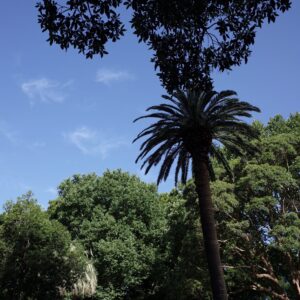The Sound of the Bell
The Decline of the Rosen Clan - Episode 1 | The sound of the great cathedral bell reminds us that all things i […]
【ハンナと先生 南の国へ行く】11. 帰国
帰国したその夜は嘴くちばしになりかけた口がもう元に戻らないんじゃないかと心配で全く眠れませんでしたが、翌朝唇くちびるが少し柔らかくなったのでようやく安心することができました。帰国から丁度1週間で、唇は元の状態に完全に戻り […]
【ハンナと先生 南の国へ行く】10. ハチドリの声
翌日の夜、ピッコロはなかなか帰ってきませんでした。「今日は遠くまで行くって言ってたもんね」それで夜になると、私たちはピッコロを待たずに晩ご飯を済ませました。けれど寝る時間になってもピッコロは帰ってきません。行き場所は分か […]
【ハンナと先生 南の国へ行く】9. ホテルの診察室
王子が元気になったと聞いて、王様はとても喜びました。早速先生を自分の住まいに招かれ、何度も何度もお礼の言葉を述べられました。そしてしばらくこの国に留とどまって休暇を楽しんでほしいとおっしゃいました。先生は喜んでその申し出 […]
【ハンナと先生 南の国へ行く】8. 恋わずらい
翌朝、私たちは王子の住まいに招かれました。私も助手ということにしてもらい、王子を刺激しないようピッコロは私の服のポケットに入れていきました。私たちは前日と同じように王宮の森に入りました。今日は空を飛ばない小型の鳥が私たち […]
【ハンナと先生 南の国へ行く】7. 大魔法使い
ペリカーノ卿に勧められるがまま、私たちは椅子に座りました。周囲をぐるりと森に囲まれている中で、先生と二人で大きなテーブルの前に座っているのは変な感じがしました。私たちはその場でしばらくじっと待ってましたが、どこか違和感を […]
【ハンナと先生 南の国へ行く】6. 王宮の森
「パロ王国に観光に来られる方はみんなこのホテルに泊まるんです。私も先生方をホテルまでお送りするようパロの王様から依頼されました」運転手が私たちの荷物を降ろすのを手伝いながら教えてくれました。私たちがいる場所は森の中と言っ […]
【ハンナと先生 南の国へ行く】5. トランジット
とても長いフライトでした。私が飛行機に乗るのはこれが初めてではありませんが、こんなにも長い時間飛行機に乗り続けたことはありません。途中でぐっすり眠ってしまったので、今が何時か分かりません。気づいたときには窓の外から見える […]
【ハンナと先生 南の国へ行く】4. エアポート
ペリカーノ卿が先生の病院にやって来た日の夜、私は気合いを高めて家に帰りました。何としてでもお父さんとお母さんを説得しなければなりません。説得には苦労するものと思っていました。ところが私が今日あったことを話し、ジョン先生と […]
【ハンナと先生 南の国へ行く】3. パロ王国からの使者
その日は雨が降っていました。病院に着いたときは小降りでしたが、雨脚あまあしはどんどん強くなり、私はお父さんに車で迎えにきてもらおうかと考え始めました。普段は庭で遊んでいる動物たちも、この日は病院の中でじっとしています。ネ […]



